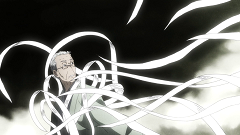Another month, another 3-gatsu post for episodes that aired a month ago. And what a couple of episodes they were – the “Burnt Field” chapters are among my favorite in the manga, and though the anime treatment didn’t stun me as the source material first did, it still managed to create an emotionally dense hour of television for which Shaft can be proud. The title of this miniature arc comes from the mouth of Yanagihara’s old friend Gan-chan, who describes his post-layoff sense of purposelessness as being in the middle of a burnt field. Something I’ve always appreciated about 3-gatsu is its presentation of diverse perspectives, and that continues here as the story chronicles the Kishou Championship fought between two older men, one of whom is the most senior Class A player in their region, if not all of Japan.
The night before the last game of their best-of-5 match, Shimada (the challenger) complains of the “away game feeling” that Yanagihara creates by inviting so many of his friends and contacts to drink at the championship venue. Despite the apparent advantage gained from that warm, lively environment, however, both Gan-chan and Yanagihara himself feel isolated by their age and circumstances. Gan-chan is uncertain of what his future will look like in the wake of his forced retirement, but Yanagihara has the opposite problem; as the oldest remaining player of his caliber, he is forced to carry the hopes and dreams of countless retired professionals. Umino-sensei visualizes these burdensome dreams as tasuki, best translated as “sash,” and that’s the word that Crunchyroll used in their translation of the anime. Seeing Yanagihara swallowed up by these white sashes is striking enough when you consider what they represent in 3-gatsu, but understanding their common use gives the scene a new dimension. Tasuki is (among other things) the term used for a sash passed between runners in long-distance relays, so Yanagihara’s possession of so many sashes indicates that he’s the only man still running in a race he once shared with dozens of competitors and friends. Contrast this lonely sense of duty with the fun party about which Shimada gripes, and it becomes clear that the older man is struggling with a burden his opponent can’t yet understand.
The tasuki metaphor isn’t the only sign of weariness that the show provides for us. We get an intimate look at Yanagihara’s morning routine, which includes the taking of various pills, medicines, eye drops, and the application of pain patches to his shoulders and back. He moves slowly through the entire process, and later, once the fifth and final game is underway, he slumps forward onto an armrest, his body wracked with pain and exhaustion. Though Shimada also lives with debilitating physical pain, he plays the role of young upstart in this fight, and seems at multiple points to have the upper hand. But the turning point comes when Yanagihara inwardly embraces his role as a representative for his generation, clutches the tasuki that once constricted him, and turns to run in the opposite direction (calling the “race” idea to mind once more). 3-gatsu has always done well at leveraging these metaphors so the uninitiated viewer can follow its shogi matches, and this episode was no exception. As Yanagihara brought his king further up the board, I was excited to see which player would triumph, even though I don’t possess an ounce of knowledge about the game. The poster for the Kishou Championship may have been on the dull side, but the contest itself was anything but.
After 169 moves, Yanagihara wins the game and the title of Eternal Kishou, having defended his position for ten consecutive years. With his legacy cemented this way, the moment must have been among the proudest of his life, and he opts to share it with all the people whose faith in him was rewarded. If I had been under that much external pressure, I can confidently say that my decision would have been to sit for the post-mortem and make everyone wait for me, their new shogi god, rather than spend that time justifying their abandonment of the game I love. The thing about Yanagihara, though, is that he plays not just for the love of the game, but for the love of others, difficult as that may be. He even invites Shimada to be in the photo commemorating his big win – but he’s not so gracious that he won’t bitch to the Chairman over drinks that everyone expects too much of him. It’s an interesting way to end the episode, given how profound his moment of acceptance was, but that’s another thing I really like about this series; nearly all of its characters are made to suffer at some point, but rather than escaping their pain and revolutionizing their lives, they must settle for merely continuing to live. Yanagihara’s aching bones won’t heal as a result of his victory, nor will the solitude of his position in the shogi world be abated. Instead, he’ll keep complaining to his close friends about whatever’s bothering him, and keep fighting for the people and things he believes in.




